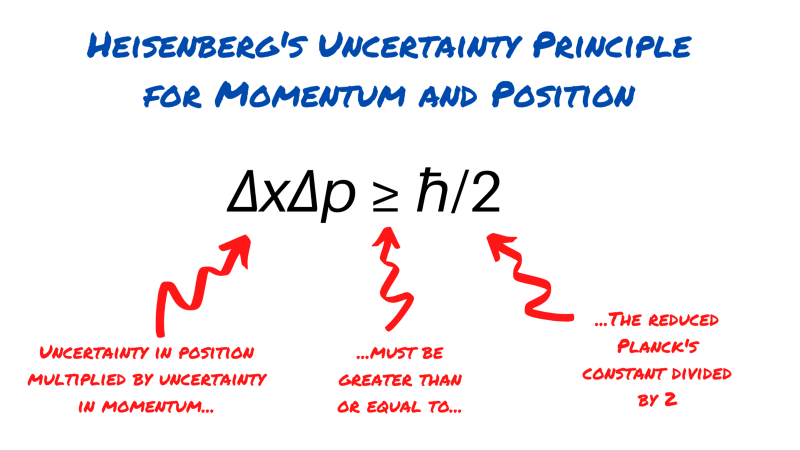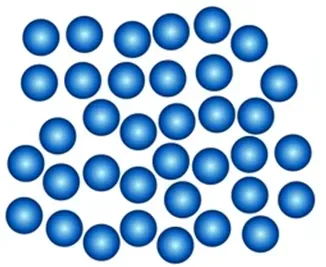Nature Isn’t Fuzzy: Quantum Uncertainty, Inconsistency and Paradox
… And Nature isn’t clear either. Nature is neither fuzzy nor not fuzzy.

There are various philosophers, logicians and scientists who’ve argued that Nature (or the world) is fuzzy, inconsistent and/or uncertain.
It’s hard to grasp what the words “fuzzy”, “inconsistent” and “uncertain” could even mean when applied to Nature (or to any given x in the world). This is the case even of things “at the tiniest scales”. It’s easy, on the other hand, to accept that things in the world may be fuzzy, inconsistent or uncertain to us — to observers or even to scientific theorists.
Yet (to take just a single example from the world of philosophical logic) the philosopher and logician Bryson Brown helpfully states the following:
“The most radical paraconsistentists, the dialetheists, are indeed against consistency, at least as a global constraint on our metaphysics. They hold that the world is inconsistent.”
Again, it’s hard to see how the world can either be inconsistent or consistent.
So the position advanced in this piece is similar — or parallel — to BaruchSpinoza’s philosophical point that the world can only… be. He wrote:
“I would warn you that I do not attribute to nature either beauty or deformity, order or confusion. Only in relation to our imagination can things be called beautiful or ugly, well-ordered or confused.”
What we say about the world (whether in science or philosophy) may well be consistent or inconsistent, fuzzy or clear, certain or uncertain. However, the world itself can be none of these things.
So what about quantum mechanics?
In basic terms, it can be argued that any fuzziness, inconsistency or uncertainty in Nature is actually a result of the measurements carried out on a quantum system (say, a particle). Or, more basically, fuzziness, inconsistency or uncertainty is a result of our observations.
On Heisenberg Uncertainty

The physicist and mathematician Roger Penrose gives us some detail on this supposed fuzziness (or uncertainty) in Nature. He writes:
“[W]e must recall carefully what Heisenberg’s uncertainty relations actually state. They do not tell us that there is something inherently ‘fuzzy’ or ‘incoherent’ in the way that nature behaves at the tiniest scales.”
In technical terms, this Heisenberg uncertainty is expressed mathematically in the following way:
ΔxΔp ≥ ħ/2
Definitions:
Δ = velocity
x = position
p = momentum
≥ = greater than or equal toħ = Planck’s constant
To use Penrose’s words again, the symbols above state that
“for a single particle, both its position and momentum in some direction, being non-commuting, cannot be determined precisely at the same time, the product of their respective errors being not less than 1/2 ℏ”.
Put another way: the position and momentum of a quantum system (such as a particle) can’t be simultaneously known in equally precise terms. Penrose continues:
“Instead, Heisenberg uncertainty restricts the precision whereby two non-commuting measurements can be carried out.”
So it’s worth going into a little detail as to what it is to be noncommuting because this notion (largely) brings about the supposed fuzziness (or uncertainty) in this particular aspect of quantum mechanics.
Noncommutativity
A binary operation (i.e., a calculation which combines two mathematical elements to produce another element) is commutative if changing the order of the operands(i.e., the mathematical objects which are “operated” upon) doesn’t change the result. Thus:
3 + 4 = 4+ 3
Or:
2 × 5 = 5 × 2
However, there are operations which are not commutative. These include subtraction (e.g., 5− 3 ≠ 3− 5) and division (e.g., 10 ÷ 2 ≠ 2 ÷ 10). These cases are referred to as noncommutative operations.
As we’ve seen, noncommutative mathematics is also used to describe the uncertainty relations found in quantum mechanics. So now if we connect the mathematics to the physics, then we’ll have the following:
Δx Δp ≠ Δp Δx
And the “difference” between each conjunct is ≥ ħ/2.
The fuzziness here is created because the accuracy of one measurement is offset by the inaccuracy of the measurement of the other (as well as vice versa). To repeat Penrose’s words:
“[B]oth [the particle’s] position and momentum in some direction, being non-commuting, cannot be determined precisely at the same time.”
Nonetheless, there is a determinate “product of their respective errors” and that is “not less than 1/2 ℏ”.
All this means that it’s not that a quantum system (or a particle) itself that’s noncommutable. It’s that the measurements of the quantum system (or particle) are noncommutable.
Now let’s take Heisenberg uncertainty much more broadly.
We can say that quantum mechanics doesn’t tell us anything about “nature at the tiniest scales”. That is, it doesn’t tell us what the nature of x or y is regardless of our observations, tests, experiments, interactions, etc. Or, more accurately, this is what the Copenhagen interpretation of quantum mechanics tells us.
So the position of quantum Bayesianism (or Qbism) is helpful here.
Quantum Bayesianism

The science writer Philip Ball stresses the importance of what he and others call information. Ball allows the physicist Christopher Fuchs to express his own informationalist view. He writes:
“[Christopher Fuchs’] approach argues that quantum states themselves — the entangled state of two photons, say, or even just the spin state of a single photon — don’t exist as objective realities. Rather, ‘quantum states represent observers’ personal information, expectations and degrees of belief’, he says.”
In other words, a photon isn’t in both spin up and spin down at one and the same time. Instead, we simply have the “information” that it can be either in spin-state up or spin-state down. That is, until a measurement is made, we simply don’t know which one it is in.
Philip Ball also quotes the physicist and philosopher of physics Jeffrey Bub as essentially putting the same point about information and quotes him saying:
“[]‘[F]undamentally a theory about the representation and manipulation of information, not a theory about the mechanics of nonclassical waves or particles’ [].”
This means that there’s an important distinction to be made between what is and the information we have about what is.
Fuchs (as presented by Ball) also makes it explicit that this stress on information is on a par with philosophical anti-realism (though neither Fuchs nor Ball never mention this philosophical position) when he argues that it isn’t an onticposition. It is, instead, an epistemic position. In Ball’s words:
“Fuchs sees these insights as a necessary corrective to the way quantum information theory has tended to propagate the notion that information is something objective and real — which is to say, ontic. ‘It is amazing how many people talk about information as if it is simply some new kind of objective quantity in physics, like energy, but measured in bits instead of ergs’, he says. ‘You’ll often hear information spoken of as if it’s a new fluid that physics has only recently taken note of.’ In contrast, he argues, what else can information possibly be except an expression of what we think we know?”
This means that stuff (as it were) gives off information, rather than stuff being information in and of itself. Yet this conflicts with what other philosophers and physicists see as information. Such people believe (as Fuchs himself seems to say) that information is in no way mind-dependent. That is, they believe that information is information regardless of minds, persons, observers, experiments, tests, etc.
The American philosopher John Searle, on the other hand, explicitly puts the information-for-us position. (Though Searle is writing about a very different context.) He writes:
“[I]nformation is typically relative to observers…These sentences, for example, make sense only relative to our capacity to interpret them. So you can’t explain consciousness by saying it consists of information, because information exists only relative to consciousness.”
Contradictions in Nature?

We also find the word “contradictory” used about Nature (or the world )— specifically when it comes to quantum mechanics.
It must be stressed here that the meaning of the word “inconsistent” is different to the meaning of the word “contradictory” (or of the word “paradoxical”). Something can indeed be inconsistent because it contains contradictions. Though something can be inconsistent without also containing (logical) contradictions.
Here’s a passage from the logician and philosopher Graham Priest on an aspect of quantum mechanics which is relevant here. He writes:
“[S]uppose that a radioactive atom instantaneously and spontaneously decays. At the instant of decay, is the atom integral or is it not?”
Now for the traditional logic of this situation. Priest continues:
“In both of these cases, and others like them, the law of excluded middle tells us that it is one or the other.”
Yet couldn’t the atom be neither integral nor non-integral when it instantaneously and spontaneously decays? (Priest talks of either/or and “one or the other”; not neither/nor.) Or, alternatively, at time t, x may not be an atom at all!
So what of Priest’s own conclusion when it comes to atomic decay?
Priest claims that the aforementioned atom “at the point of decay is both integral and non-integral”. This isn’t allowed — Priest says — if the law of excluded middle has its way. After all, the law of excluded middle tells us that the the atom must either be integral or nonintegral; not “both integral and non-integral”.
Conclusion

All the cases above are really about human perceptions and theories of the world, not the world itself. They also concern the inconsistencies and uncertainties in our scientific theories about the world. Of course the next move may be to question this (possibly bogus) distinction between the world and our statements about — and knowledge of — the world.
All in all it can be said that many philosophers and scientists surreptitiously use (broadly speaking) anti-realist positions in epistemology and the philosophy of science to back up (or defend) their belief that Nature is fuzzy (i.e., inconsistent, uncertain or even contradictory). Yet anti-realism (or at least this version of anti-realism) argues that the world itself can’t be fuzzy.





